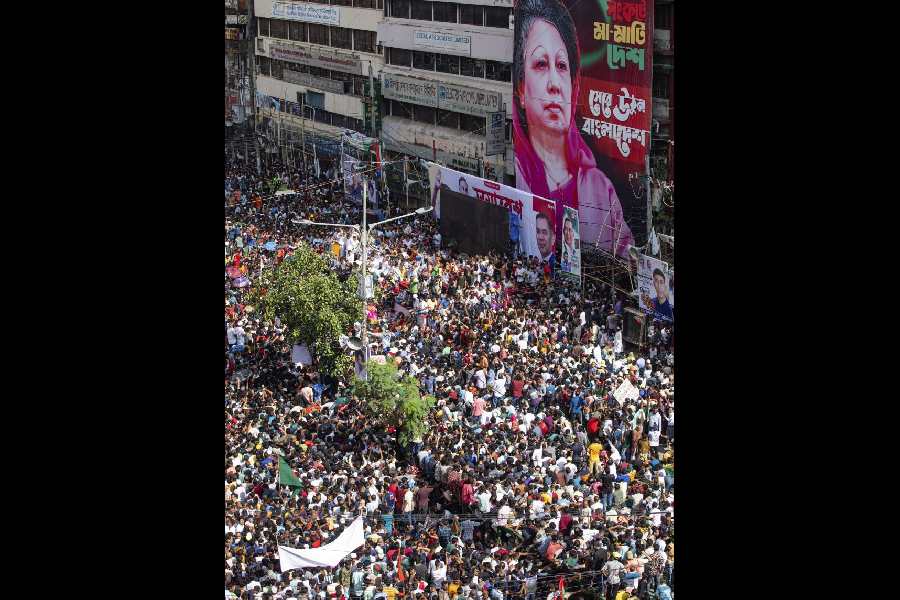Bangladesh army chief Waker-Uz-Zaman said on Wednesday that the interim government, to be headed by Nobel Peace Prize winner Muhammad Yunus, would be sworn in on Thursday evening.
The announcement came amid reports of lawlessness in the country ravaged by violence, vandalism and indiscriminate killings since the resignation of Sheikh Hasina as Prime Minister on Monday.
The army chief said Yunus would have an advisory council of 15 members.
Even as a section of Bangladeshis hoped that Yunus would restore order and make the institutions work, there were others who flagged the challenges that the “Banker to the Poor” would face in steering the country out of an unprecedented crisis as he would have to deal with forces like the BNP and the Jamaat-e-Islami.
The key challenge, a source said, will be the difference in objectives between Yunus and political parties like the BNP.
“Yunus has indicated that he needs three to six years at the helm to fulfil the goal of nation-building.... But the BNP leadership wants the interim government to hold the elections as soon as possible,” said an observer, referring to the video address of Tareq Rahman, acting chairperson of the party, from London where he is in exile since 2008.
Rahman, who was the top draw at a massive BNP rally in Dhaka, said: “Elections must be held as soon as possible and power has to be handed over to those elected by the people of the country.” Such an assertion, even before the interim government begins its work, will be an impediment to restoring order in a country where most institutions need to be rebuilt, said the analyst.
After days of lawlessness — in the absence of law-enforcing agencies and the anarchy across the country in which over 1,000 people have been killed — some baby steps to restore order were witnessed with the appointment of a new police chief. There was also a change of guard in the Dhaka Metropolitan Police and the Rapid Action Battalion and a large-scale reshuffle in the armed forces.
As several key posts are vacant in the country’s overall administrative structure — from the judiciary to banking — after appointees by the earlier regime were made to resign over the last couple of days, the Yunus-led team has its task cut out. “The changes in the police or the reshuffle in the army have political influence and the imprints of the BNP and the Jamaat.... The question is, whether Yunus would be comfortable with all these,” said another analyst.
Political appointments in key posts, however, is not new as the Hasina regime or the earlier BNP-led governments were also accused of preferring loyalty over merit. Such a practice, multiple observers said, ended up affecting the efficiency of the institutions.
“We badly need reforms and a new culture that’s rooted in meritocracy.... The students want a longer term for him, but not BNP and Jamaat. Can Yunus do it in a few months?” asked an observer.
A senior journalist, however, had an alternate view as he said that Rahman did the right thing by mentioning the need to hold elections.
“First, it will keep the interim government under pressure as there have been earlier instances of caretaker governments extending their term and staying on... Besides, you need a Parliament to enact legislation and that’s why we need elections,” he said.
The debate over tenure is not the sole issue that’s being discussed in Dhaka before the 84-year-old Yunus, who is set to return to Bangladesh on Thursday, begins his new innings. His deliverables are also being talked about and the list has several difficult entries — give justice to those affected by violence, instil confidence among ordinary people, especially the minorities, and revive the economy, which is already in a crisis due to high unemployment, runaway inflation and dwindling foreign exchange reserves.
Yunus — known across the world for his Grameen Bank experiment — will also have to live up to the expectations of the international community, especially the US, the European bloc and important neighbours like India and the Gulf countries, where millions of Bangladeshis work.
“Several world leaders like Hillary Clinton have welcomed his appointment as the head of the interim government.... As Yunus has a standing beyond Bangladesh, he would not like it to be sullied by the developments in Bangladesh,” said a source, referring to the string of jail breaks, incidents of robbery at armouries at police stations, reports of attacks on minorities and rampant looting.
As there are reports of some terrorists escaping the prisons and arms looted from the police reaching hardline Islamists, there are concerns about security in the country and the entire sub-continent.
“He cannot address all these problems without the cooperation of the political parties that are supporting the interim government.... The question is, whether he will get the necessary help,” said a source.
In his address, Rahman appealed to the people for restraint and to refrain from any attacks on vulnerable sections. His mother and former Premier Begum Khaleda Zia’s video address was also laced with appeals to maintain peace. The student leaders, credited for Hasina’s fall, have also been making similar appeals.
The message didn’t seem to trickle down to the ranks as there were reports that BNP supporters, accompanied by the Jamaat, had gone on a rampage across the country targeting Awami League supporters and minorities. The Islamist agenda of the ranks was also evident across the country as they vandalised sculptures, murals and institutions promoting art and culture.
“We did not support the movement against Hasina to witness these scenes... This mindless violence and vandalism has to stop,” said a professor of a private university, who was seen at the forefront of the street protests against Hasina.










